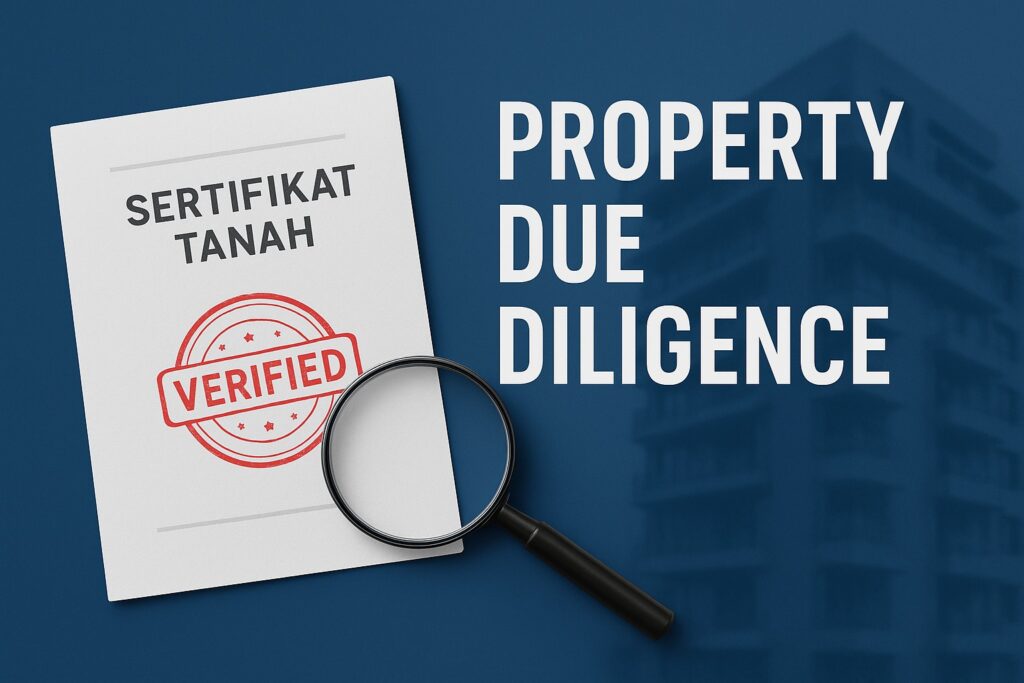A Complete Guide for Real Estate Investors in Indonesia
When it comes to real estate investment, especially in Indonesia, conducting Legal Due Diligence (LDD) is not just a best practice it’s a necessity.
Property ownership in Indonesia involves a complex web of land titles, permits, and regulations. Without proper due diligence, investors risk buying property with unclear ownership, zoning restrictions, or ongoing legal disputes.
This article provides a step-by-step guide on what to check during property due diligence in Indonesia, with a focus on land titles, building permits, zoning compliance, and potential disputes.
Why Legal Due Diligence Matters in Real Estate
Before diving into the checklist, it’s important to understand why LDD is crucial in real estate transactions:
- Protects investors from fraud and invalid ownership claims.
- Ensures regulatory compliance, especially regarding land use and building permits.
- Avoids costly litigation arising from disputes or defective titles.
- Safeguards long-term investment value by verifying lawful use and zoning compatibility.
Whether you are purchasing land, acquiring commercial property, or developing a hotel or villa, legal due diligence in real estate helps you identify risks before they escalate.
1. Land Title Verification (SHM vs. HGB)
The foundation of property due diligence is verifying the land certificate:
- Sertifikat Hak Milik (SHM / Freehold Title): The strongest form of land ownership, available only to Indonesian citizens.
- Sertifikat Hak Guna Bangunan (HGB / Right to Build): Commonly held by companies (including PMA entities) and valid for building on state land.
Key points to verify:
- Authenticity and validity of the certificate issued by the National Land Agency (Badan Pertanahan Nasional / BPN).
- Whether the title is free from encumbrances such as mortgages (Hak Tanggungan), seizures, or claims.
- The certificate matches the cadastral map and actual land boundaries.
Tip: Always conduct a title search at the BPN to ensure no overlapping ownership or pending disputes.
2. Building Permits (IMB/SLF) and Development Rights
Owning land does not automatically allow you to build. You must ensure the property has the correct permits:
- Izin Mendirikan Bangunan (IMB / Building Permit): Authorizes construction and defines the intended use (residential, commercial, hospitality, etc.).
- Sertifikat Laik Fungsi (SLF / Building Worthiness Certificate): Confirms the building is safe and complies with regulations.
Checks during due diligence:
- Does the building have a valid IMB/SLF?
- Does the approved use align with your investment purpose?
- Are additional structures (extensions, renovations) also covered by permits?
3. Zoning and Spatial Planning Compliance
Zoning is a critical yet often overlooked aspect of real estate due diligence in Indonesia. Local governments regulate land use through zoning and spatial planning (Rencana Tata Ruang Wilayah / RTRW).
During due diligence, check:
- The sub-zone classification of the land (residential, commercial, tourism, green belt, etc.).
- Whether your intended project (e.g., hotel, villa, factory) complies with zoning rules.
- Any restrictions that may impact future development.
Non-compliance with zoning can lead to fines, closure orders, or even demolition of the property.
4. Potential Disputes and Litigation
Indonesia has a long history of land disputes due to inheritance claims, overlapping certificates, and unclear boundaries. Investors must:
- Check with BPN and the local court registry for any ongoing or past disputes.
- Verify physical boundaries against the official cadastral map.
- Investigate the chain of ownership transfers to detect irregularities or fraudulent transactions.
5. Additional Key Checks
- Environmental Compliance: Certain projects require Environmental Impact Assessments (AMDAL/UKL-UPL).
- Tax Obligations: Confirm that Land and Building Tax (PBB) is fully paid.
- Access and Easement Rights: Ensure the property has secure legal access to public roads and utilities.
Conclusion: Securing Your Real Estate Investment
In Indonesia’s dynamic real estate market, legal due diligence is the key to safe and profitable transactions. By carefully verifying land titles, building permits, zoning compliance, and dispute history, investors can avoid costly legal traps and protect their assets.
Partnering with a qualified real estate lawyer or property law specialist ensures that no critical detail is overlooked. From reviewing ownership documents to assessing regulatory risks, professional guidance provides the assurance you need before finalizing any property deal.
If you are planning to invest in Indonesian property, our legal team is ready to assist you with comprehensive due diligence and tailored legal solutions.
Contact us today to schedule a consultation and secure your investment with confidence and long-term security.

